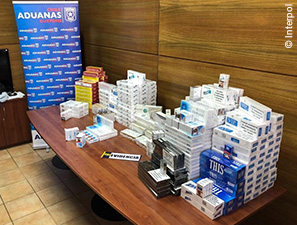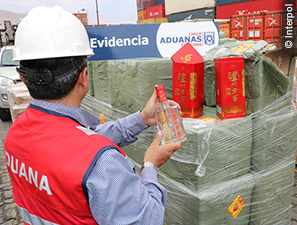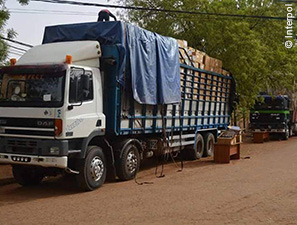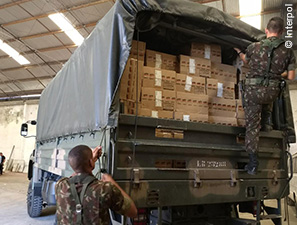As was now released, Interpol has led a large-scale anti-counterfeiting operation across 36 countries* in Africa, Asia, the Middle East and South America, March through May 2018. In total, around 7.2 million counterfeit and illegal products estimated at around 21.4 million euros were confiscated. These primarily include pharmaceuticals, foodstuff, vehicle parts, tobacco products, clothing, and agricultural chemicals.
In total, more than 1,300 investigations were initiated during the three-month Interpol operation and 645 suspects were identified or arrested. According to Interpol, the aim of the operation was to dismantle illegal factories and disrupt the supply chains of criminal counterfeiting networks. In South America, for example, some three million packages of illegal cigarettes and cigars, several tons of counterfeit food and alcohol and tens of thousands of counterfeit fashion accessories were seized.
The authorities paid particular attention to counterfeit medical products, as numerous successful campaigns from Africa, for example, show: e.g. in Tanzania, where local authorities confiscated counterfeit antibiotics, malaria tablets, iron sulphate and analgesics. In Zimbabwe, investigators found thousands of fake tablets and around 250 kg of adulterated body lotion. In Ghana and Ivory Coast, ten pharmacies dealing in counterfeit drugs and an illegal factory for adulterated pharmaceuticals were shut down. In addition, a container coming from India with around 500,000 counterfeit pills was stopped in Jordan’s seaport of Aqaba.
The operations were codenamed Afya and Heera II in Africa, while activities in Asia were referred to as Rainfall, in South America as Jupiter IX and in the Middle East and North Africa as Qanoon. „By attacking the distribution networks, and by disrupting production at the source, participating countries have contributed towards globally protecting people from potentially unsafe goods, and made them safer by dismantling illegal networks which are often connected to other forms of serious crime,” said Tim Morris, Executive Director of Police Services at Interpol.




© Interpol




